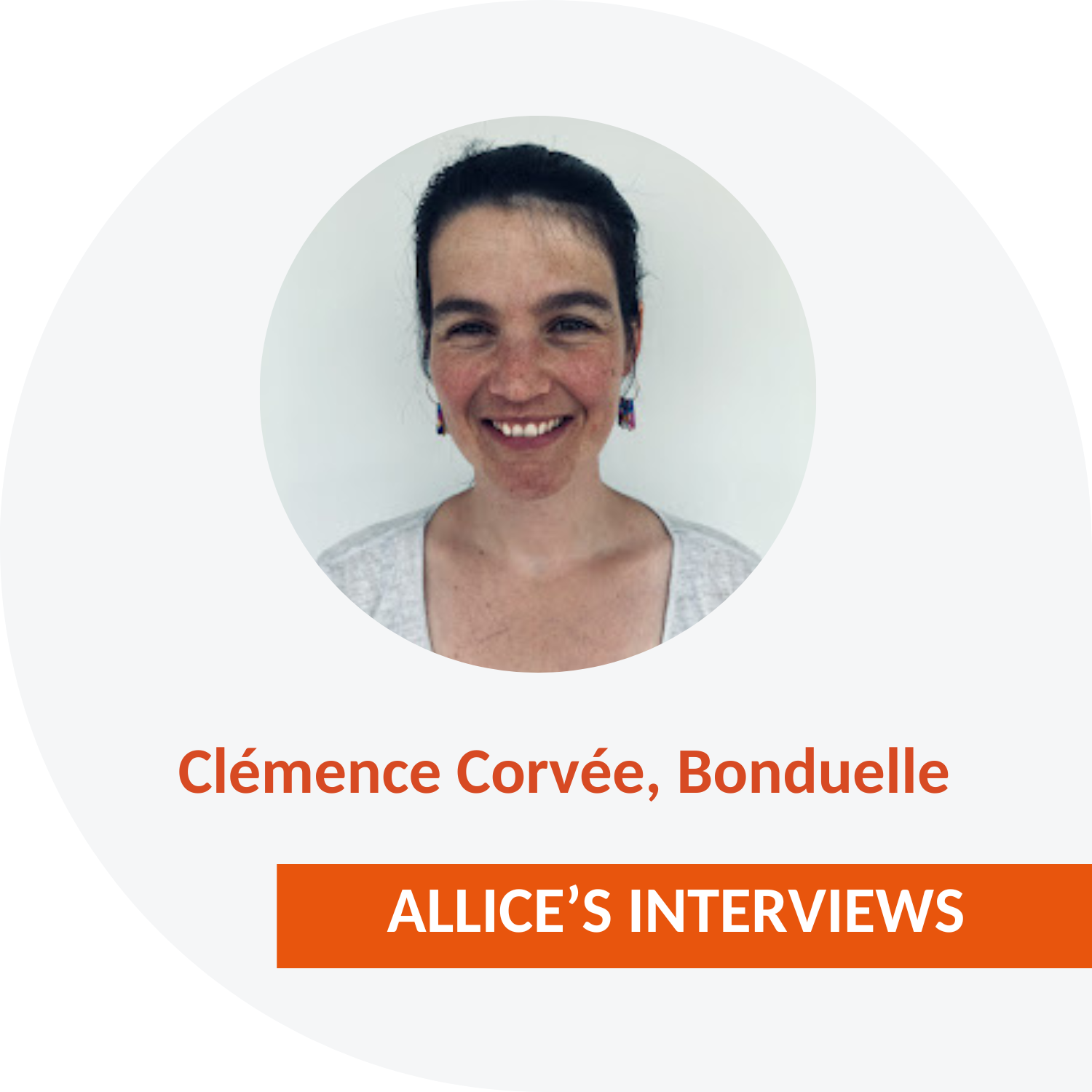
News
ALLICE's interviews: Decarbonisation must be a means, not an end, to the environmental transformation of industry and, by extension, our society.
On 06|11|2024
Published on 06|11|2024
‘Decarbonisation must be a means, not an end, to the environmental transformation of industry and, by extension, our society.’
Clémence Corvée, Environment and Energy Manager at Bonduelle.
ALLICE : Bonduelle is the world leader in ready-to-use vegetables, with 58 sites and a presence in 18 countries. On this scale, it's easy to imagine the extent of the decarbonisation and energy transition required. How is the Bonduelle Group addressing this challenge?
Clémence Corvée : The stakes are high. But I would say that our main advantage is that we are a family group with a culture close to the land, which provides us with our raw materials. Our connection with the fields has given rise to a strong awareness of environmental and climate issues, particularly in terms of regenerative agriculture. We then turned our attention to the challenges of decarbonisation and energy transition.
What have been the different stages of this process so far?
We have set ambitious targets for decarbonisation and energy transition. We started in 2015 with energy audits that were carried out at all levels of the plants and industrial sites. Today, the vast majority of our French and European sites are ISO5001 certified, which has accelerated our energy efficiency drive and the implementation of projects.
The Group has also embarked on a BCORP certification objective, which looks beyond carbon. This is a broad-based certification for companies with a positive impact that assesses our CSR commitment, i.e. our impact on the environment and our social commitments. Today, 80% of our scope is certified, with a target of 100% by 2025.
Our Group is also committed to a SBTI [Science-Based Target Initiative] strategy, with the objective of achieving net zero by 2050. This commitment has given a boost to energy transition issues, which will then be taken forward by the energy managers at each site.
Do you have any outstanding examples of decarbonisation initiatives?
Yes, we have installed a biomasse boiler at our historic site in Renescure. The project is supported by ADEME and was inaugurated in June 2024.
This boiler will be used as part of the steam production process for blanching vegetables and sterilising our tins. This boiler represents 6,000 tonnes of CO2eq avoided. It's our biggest project to date.
How are you thinking about the trade-offs to be made: technologies, changing the energy mix, etc.?
We began by installing several technologies independently. Now we are at the stage where we are structuring a global and detailed strategy to achieve our final objective.
At this stage, the ALLICE studies on the different solutions are very useful to us. They enable us to find out what's being done elsewhere in terms of technologies: solar thermal, EHV heat pumps, heat recovery, and so on. ALLICE also enables us to benefit from feedback from other manufacturers.
Has any particular study helped you?
Yes, for example, we used the study on decarbonising the agri-food industry as a kind of benchmark: how can we improve energy efficiency? What are the limitations of certain technologies? Which ones are best suited to our processes? The ALLICE study gives us a focus, an opening for further technical exchange. It's a pool of ideas to look at, to keep us posted of what's going to come out in the long term.
The ALLICE studies enable us to make a more informed choice of all available solutions and to better assess their impacts, constraints, investment and operational costs. We are setting out our different options and building on the building blocks we have identified as priorities.
After a period of evaluation, we will decide which levers to activate first. The final stage involves presenting our various options to our decision-makers.
How are your decision-makers and managers tackling these issues?
The discussion is very open, bearing in mind that carbon issues require quite specialised knowledge in terms of magnitudes, possibilities and so on. So as energy consultants, we have a key role to play in sharing our expertise in this area.
The stakes are high: we have a wide range of possibilities, with many parameters to take into account: investment, operating costs, available deposits.
In my view, communication on these subjects is the key to success: we need to provide a culture, vocabulary and orders of magnitude, and educate people about the constraints of decarbonisation so as to combine them with OPEX and CAPEX.
To successfully implement this strategy, we need to go beyond the decision-makers and mobilise and convince the Group's other employees.
Absolutely, and that's part of one of my actions and goals: to give everyone the ability to understand the challenges of the energy and environmental transition. I would say that we need to ‘animate’ these carbon issues to make them visible and concrete at the various levels of the organisation.
Today, it's difficult to imagine in concrete terms how many tonnes of CO2 a site represents. But the more we talk about it, the more we imagine, the more everyone will share their vision of this carbon, and the more we will succeed in decarbonising and doing things differently.
Even if there is a certain sensitivity to ecology in our group, not everyone has the same level of knowledge on the same subjects. That's why I try to create a network, contribute my expertise and structure a roadmap.
Will this require coordination with the various functions within the Group?
Yes, it's a real team effort! I'm supported by an expert who counts our carbon and defines the targets according to the standards. Then I coordinate with the experts in the other areas so that we can develop joint actions. For example, we are currently developing a carbon footprint simulator.
From my point of view, it is certainly important to take carbon into account, but decarbonisation must be a means and not an end in the environmental transition.
Are you saying that decarbonisation should not be the industry's only environmental objective?
That's it. Obviously, businesses need to reduce their energy consumption and CO2 emissions, but we mustn't ignore the other issues that are emerging at the same time and which are just as important for our ecosystems, notably biodiversity and water.
Of course we need to decarbonise, but we also need to encourage new ways of doing things, rethinking the use of our resources and our means of production. In this respect, manufacturers have an important role to play in the ecological transition: they are both the driving force behind their own transformation and the vector for that of our society, promoting new ways of consuming.
How can manufacturers help change the way we consume and thus help change society?
Well, if I take the case of Bonduelle, for example, the emissions avoided will obviously be in our processes at our production sites, but I like to look further afield.
I firmly believe that we are a player in the food transition: for example, we are widely developing the legume sector to encourage diets that tend towards vegetarianism and flexitarianism.
The food transition is an extremely important lever, encompassing both technical and cultural issues, involving new production and consumption methods.
I'm convinced that we can go part of the way with technical solutions. For the rest, we're going to have to challenge the way we produce and consume. Manufacturers have a role to play in making the transition desirable. It's important that we get these messages across and make them visible.
What's more, we are decarbonising our sites, but we also need to reduce our emissions both upstream and downstream of our value chain (our SCOPE 3), which ultimately accounts for more than 80% of our emissions! This is one of the things our customers are asking us to do.
You mean your customers are challenging you on this point?
Yes, absolutely. For example, as part of our SBTI commitment we had set a target of -38% by 2035 compared with 2020. We are currently reassessing our target against a more ambitious trajectory requested by our customers and stakeholders (1.5°C scenario). We are going to increase our efforts. We also receive regular questionnaires on our environmental impact from our customers - and we also question our suppliers. It's a virtuous circle, with everyone encouraging each other to do better.
Finally, a word about your personal background. You seem to be driven by real convictions, particularly in your professional life. Has this always been the case
No, I haven't always held a position like this. I originally trained as a chemical engineer. I started my career on a chemical site as a process engineer. By force of circumstance, I was given assignments to optimise production processes, with a focus on energy, as part of the ISO 50 001 certification in 2015. At that point, I realised that I could take concrete action at my level to reduce energy consumption. At the same time, the subject was emerging more and more in companies, and I realised that I could turn it into a job in its own right.
What does your commitment mean on a day-to-day basis?
I'm in charge of structuring the Group's environmental and energy approach. I'm in charge of everything we've just talked about: creating monitoring tools, standardising, highlighting needs, creating networks of best practices, supporting technical projects. There's never a dull moment! (laughs).
To align my professional life with my personal convictions, I joined Bonduelle and joined a group that is working for the food transition, which is a powerful lever! These prospects for major transformation give a lot of meaning to my professional activity.

